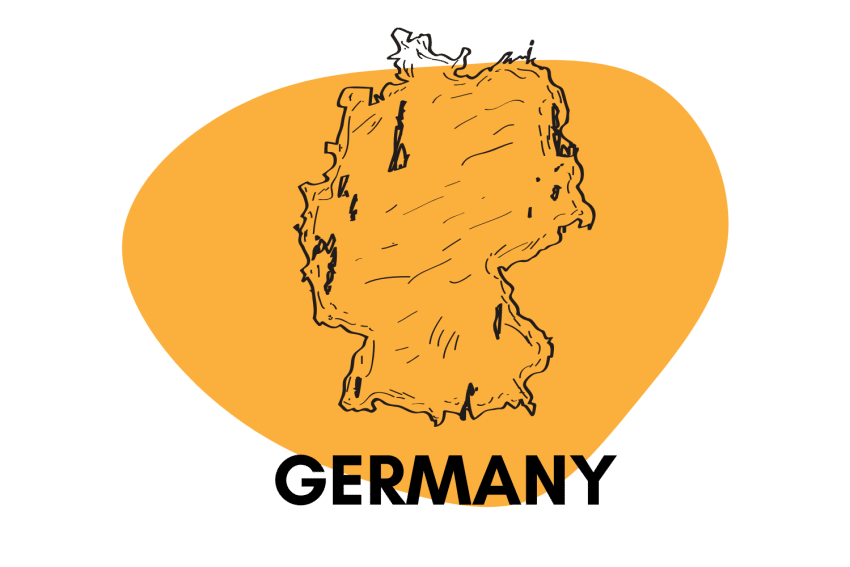Are Psychedelics Legal in Germany?
We could see decriminalization policy changes within the German legal system by the end of 2022.

Germany is notorious for its forward-thinking approach to politics and regulations — yet they remain one of the strictest in Europe in regards to how they regulate psychoactive substances.
Here, we’ll explore how Germany regulates various psychedelics — including magic mushrooms, LSD, MDMA, ketamine, and more.
Summary of Germany’s Psychedelic Drug Laws
- Possession carries up to five years in prison or a fine.
- These penalties can be reduced if the amount in possession is small.
- Local laws often determine what’s considered “small.”
Germany’s Drug & Penalties Chart
| Class | Substance | Psychedelics | Penalties for Possession |
| I (Non-marketable) | Heroin, cannabis | MDMA, LSD, psilocybin | Up to 5 years in prison or a fine; Small amounts (6-10 g of cannabis; others often defined by local laws) may mean reduced penalties |
| II (Marketable, but not by prescription) | THC, dexamphetamine, coca leaves | See above | |
| III (Marketable, by prescription) | Opium, morphine, methadone | See above |
Sources:
- Act to Regulate the Trade in Narcotics, Chpt 4, S 29 (Criminal Offenses)
- Medical Marijuana Act
- Import, Export, Storage, & Distribution of Controlled Drugs – Regulations in UK, France, & Germany
Are Magic Mushrooms Legal in Germany?
Magic mushrooms are illegal in Germany.
You can’t use psilocybin, magic mushrooms, or any part of the fungi legally (including medical use).
German authorities recently amended their Executive Order 698, passed in 1993, which regulates psychoactive substances. The new amendment patched the mycelium or “grow kit” loophole still present in most countries around the world.
This loophole allowed vendors to sell magic mushroom mycelium grow kits. These kits didn’t contain psilocybin mushrooms; rather, the mycelium they come from. Users could buy a kit and use it to grow their own mushrooms.
Now, even these grow kits are banned in Germany.
Related: Where are magic mushrooms legal?
Map of Magic Mushroom Laws In Europe
Do Magic Mushrooms Grow Wild in Germany?
Yes, many species of magic mushrooms grow naturally in Germany. Forests make up about a quarter of the territory, providing ideal landscapes for mushroom hunting.
The Black Forest in the southwest and the Bavarian Forest on the border with the Czech Republic is notorious for mushroom hunters living in Germany.
That said, don’t forget that it’s illegal to cultivate and possess shrooms in Germany. Fines for breaking these laws include fines of 5000 euros (or more).
The most common mushroom species in Germany are:
- Psilocybe cubensis
- Conocybe cyanopus
- Gymnopilus junonius
- Gymnopilus purpuratus
- Inocybe aeruginascens
- Inocybe coelestium
What Are the Medicinal Uses of Shrooms?
Today, science has proven that magic mushrooms have legitimate medicinal value for several health conditions:
- Migraines & cluster headaches
- Treatment-resistant depression
- Existential anxiety in end-of-life care
- Post-traumatic stress disorder (PTSD)
- Addiction & substance abuse
Research has also shown that psychedelics can be useful to enhance problem-solving skills and boost creativity.
Is LSD Legal in Germany?
LSD stands for lysergic acid diethylamide. It was invented by a Swiss chemist by the name of Albert Hofmann.
LSD is illegal in Germany. There is currently no accepted medicinal value for LSD in the country.
Not so long ago, you could get 1P-LSD legally in Germany. However, in 2019, after the 979th federal council meeting, authorities made 1P-LSD and 1CP-LSD illegal too.
A newer LSD-derivative called 1V-LSD (AKA “Valerie”) is available from select online vendors in Germany. This analog has not yet been banned.
Is MDMA Legal in Germany?
MDMA (ecstasy) and other amphetamine psychedelics remain illegal in Germany.
MDMA is a prevalent party drug. It’s considered a euphoric, empathogen, and mild psychedelic.
The possession of more than 30 mg of MDMA is punishable with fines of +5000 euros and 1-5 years imprisonment depending on the amount.
Is Ketamine Legal in Germany?
Ketamine is only legal in Germany for medicinal applications (used for PTSD, depression, and anesthesia).
Ketamine has been around since 1960 and was actively used as an anesthetic for surgery or trauma treatment. Today, it is mainly used in vet clinics as a potent sedative and anesthetic.
Nowadays, ketamine has a high prevalence in the party scene. In smaller doses, it’s used similarly to MDMA. In higher doses, the effects become much more dissociative and psychedelic.
What’s The Difference Between Legalization & Decriminalization?
Legalization and decriminalization may sound similar, but they mean two different things.
First, legalization removes all penalties for possession of a substance. There may still be some restrictions, such as age or how much one is allowed to possess at a given time.
Decriminalization is a little bit different. A decriminalized substance is still illegal and punishable with a fine or confiscation of the product — but it no longer brings a criminal charge (and resulting jail time).
Most countries are moving to decriminalize psychedelic substances. Full-fledged legalization is unlikely in the near future.
Key Takeaways: What’s The Future of Psychedelics in Germany?
Germany is relatively rigid with its drug laws.
However, large social movements oppose this and it’s very likely we’ll see the decriminalization of marijuana, psilocybin, and potentially other psychoactive substances in Germany by the end of 2022.